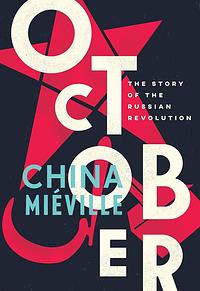Take a photo of a barcode or cover
I love Mieville's fiction and he writes history just as deftly and wryly. Better consumed in print than as an audiobook (although John Banks does a fine job with the narration), unless you have a much better attention span than I...
The wild world-building and philosophical rigor of Mieville's fiction should lend itself well to a historical thriller of ideas. In many ways, it does. I had only an American high-school introduction to the Russian revolution prior, so I learned a great deal while enjoying every minute. The read is exciting, often funny, and morally clear.
What October lacks, narratively speaking, is any sense of build. The pace is furious from page one. The tone, dialectically ironic yet incantatory, is that of Mieville's climaxes. His novels earn their climaxes the old-fashioned way, through narrative formation of the audience. October seems to me to assume at least a little bit of a pre-formed reader, one ready to thrill to revolutionary slogans and statements through familiarity. The clue is that he often refers to future fame or provocation from the events, but does not return to the theme. I was inclined to be sympathetic to these slogans and events, but not already familiar, and so felt a bit on the outside of the intended audience.
What October lacks, narratively speaking, is any sense of build. The pace is furious from page one. The tone, dialectically ironic yet incantatory, is that of Mieville's climaxes. His novels earn their climaxes the old-fashioned way, through narrative formation of the audience. October seems to me to assume at least a little bit of a pre-formed reader, one ready to thrill to revolutionary slogans and statements through familiarity. The clue is that he often refers to future fame or provocation from the events, but does not return to the theme. I was inclined to be sympathetic to these slogans and events, but not already familiar, and so felt a bit on the outside of the intended audience.
Hm. I liked this book, but only barely--I'm not sure that most folks would want to spend 300 pages diving so deeply into the eddying and swirling river of alliances, whipsawing declarations, and shifting public sentiment that was Russia in the run-up (and early days) of the Russian Revolution.
I found myself struggling to keep track of (and hold interest in) the here-today, gone-tomorrow opinions of the various thinkers, Congresses, and Soviets that took part in shaping Russia's post-monarchist future. "Come on," I thought to myself, "Tell me more about the major players, not these cast-offs that I've never heard of." But that's just the point of this book. All of these different events and streams of thought, diverted and shaped by stones and outcroppings of chance, fed into the overall river that, looking back, comes to be seen as the inevitable flow of history. But as Mieville makes very clear, the outcome was not preordained--a dis/obeying unit here, a slightly shifted demonstration timeline there, and Russia (and with it, the world) might have been a very different place. And the details of the February-October timeframe lay the groundwork for understanding what comes next.
An effective, but very niche book. For casual readers, a higher level view that covers a wider swath of time might be more interesting.
I found myself struggling to keep track of (and hold interest in) the here-today, gone-tomorrow opinions of the various thinkers, Congresses, and Soviets that took part in shaping Russia's post-monarchist future. "Come on," I thought to myself, "Tell me more about the major players, not these cast-offs that I've never heard of." But that's just the point of this book. All of these different events and streams of thought, diverted and shaped by stones and outcroppings of chance, fed into the overall river that, looking back, comes to be seen as the inevitable flow of history. But as Mieville makes very clear, the outcome was not preordained--a dis/obeying unit here, a slightly shifted demonstration timeline there, and Russia (and with it, the world) might have been a very different place. And the details of the February-October timeframe lay the groundwork for understanding what comes next.
An effective, but very niche book. For casual readers, a higher level view that covers a wider swath of time might be more interesting.
I enjoy Mieville's lyrical, evocative style, but it's just too short and cursory as a history book. The large further reading section is worth more than the text itself.
Oh boy I wish I were good with words.
As a socialist, I often have to deal with the not ENTIRELY unreasonable claim that socialism doesn't work. I usually respond with some flavor of "Leninism doesn't work," then go into some long-winded digression on how capitalism isn't really working either. Over the years these arguments have pushed me away from Marxism to some form of libertarian anarchism, but that's neither here nor there.
Reading October was the first time I've really dove into the history of the Russian Revolutions, and in doing so I've come to better appreciate the decisions of the Bolsheviks and their opposition. They really had no idea what they were doing and I'm sure that most (if not even all) of the major players in the historical narrative were doing what seemed right. Bolshevism does seem more sympathetic in this light. In fact, one of the lines that most struck me wasn't even in the main narrative itself, but a quote from Victor Serge in the Further Readings section:
"It is often said that 'the germ of all Stalinism was in Bolshevism at its beginning'. Well, I have no objection. Only, Bolshevism also contained many other germs, a mass of other germs, and those who live through the enthusiasm of the first years of the first victorious socialist revolution ought not to forget it. To judge the living man by the death germs which the autopsy reveals in the corpse—and which he may have carried with him since his birth—is that very sensible?"
I cannot ignore the authoritarian tendencies of Leninism, but I have to wonder at and bemoan what could have been, had the international revolution proceeded and the Western world not declared their intention to "Kill the Bolshie, kiss the Hun", as Churchill so famously announced.
As a socialist, I often have to deal with the not ENTIRELY unreasonable claim that socialism doesn't work. I usually respond with some flavor of "Leninism doesn't work," then go into some long-winded digression on how capitalism isn't really working either. Over the years these arguments have pushed me away from Marxism to some form of libertarian anarchism, but that's neither here nor there.
Reading October was the first time I've really dove into the history of the Russian Revolutions, and in doing so I've come to better appreciate the decisions of the Bolsheviks and their opposition. They really had no idea what they were doing and I'm sure that most (if not even all) of the major players in the historical narrative were doing what seemed right. Bolshevism does seem more sympathetic in this light. In fact, one of the lines that most struck me wasn't even in the main narrative itself, but a quote from Victor Serge in the Further Readings section:
"It is often said that 'the germ of all Stalinism was in Bolshevism at its beginning'. Well, I have no objection. Only, Bolshevism also contained many other germs, a mass of other germs, and those who live through the enthusiasm of the first years of the first victorious socialist revolution ought not to forget it. To judge the living man by the death germs which the autopsy reveals in the corpse—and which he may have carried with him since his birth—is that very sensible?"
I cannot ignore the authoritarian tendencies of Leninism, but I have to wonder at and bemoan what could have been, had the international revolution proceeded and the Western world not declared their intention to "Kill the Bolshie, kiss the Hun", as Churchill so famously announced.
challenging
inspiring
reflective
sad
slow-paced
Like couple semesters of Russian history studies all in one go. Impressively comprehensive, but I was perhaps hoping for something with a more characterized cast and wit in expression to make the 'cramming' more palatable.
This is an interesting angle on the Russian revolution, where instead of a bird's eye view with a long list of historical antecedents, we get the daily development of the revolution, from February to October 1917. Instead of the "inevitable wave of history" feeling I often get when reading history, with October I felt a real connection to the time and place of the revolution. Besides the fact that this makes for a more compelling story, it also helps dispel the notion that there's anything inevitable or uniquely Russian about how the revolution ultimately panned out.
The book suffers a bit from having to include so many actors and separate interest groups in a single narrative. There are just too many names to remember. (There's a glossary, which given that I was reading this on a Kindle was not much help.) The reading is probably more enjoyable to those who already have some decent knowledge of the revolution, which prior to reading this I did not.
The book suffers a bit from having to include so many actors and separate interest groups in a single narrative. There are just too many names to remember. (There's a glossary, which given that I was reading this on a Kindle was not much help.) The reading is probably more enjoyable to those who already have some decent knowledge of the revolution, which prior to reading this I did not.
I knew almost none of this history before, and October was a tremendously satisfying way to learn some of it.
This was at times a difficult read as the sea of foreign-to-me Russian names made it occasionally difficult to keep characters and parties straight, but it's a thrilling and page-turning story all the same.
Miéville's lush writing is a draw, but the story is on rails anyway, you can't help but be borne along.
This was at times a difficult read as the sea of foreign-to-me Russian names made it occasionally difficult to keep characters and parties straight, but it's a thrilling and page-turning story all the same.
Miéville's lush writing is a draw, but the story is on rails anyway, you can't help but be borne along.
The revolution of 1917 is a revolution of trains. History proceeding in screams of cold metal.Γεμάτη δράση η μυθιστορηματική αποτύπωση των γεγονότων που οδήγησαν στην Οκτωβριανή Επανάσταση, με τη διαφορά πως ως υλικό η πραγματική ζωή σε αντίθεση με την πλοκή ενός μυθιστορήματος είναι πιο ιδιόμορφη και πολύ πιο λεπτομερής. Ο αριθμός των εμπλεκόμενων ατόμων και μερών, οι αποφάσεις που πάρθηκαν και που ακυρώθηκαν, το χάος κι η επανάσταση που κινήθηκε σαν ένα τρένο τη νύχτα, φαινομενικά ασταμάτητη κι αναμφισβήτητα επικίνδυνη δίνονται με τρομερή ενάργεια, ενώ o Miéville εμφανίζεται να κατέχει το ζήτημα που αναλύει, ιστορικά και ιδεολογικά, απεικονίζοντας άρτια και τίμια την ακατάστατη διαδικασία και τα λάθη των dramatis personae, μένοντας όσο το δυνατόν πιο απροκατάληπτος, ισχυριζόμενος πως
Those who count themselves on the side of the revolution must engage with these failures and crimes. To do otherwise is to fall into apologia, special pleading, hagiography – and to run the risk of repeating such mistakes.




